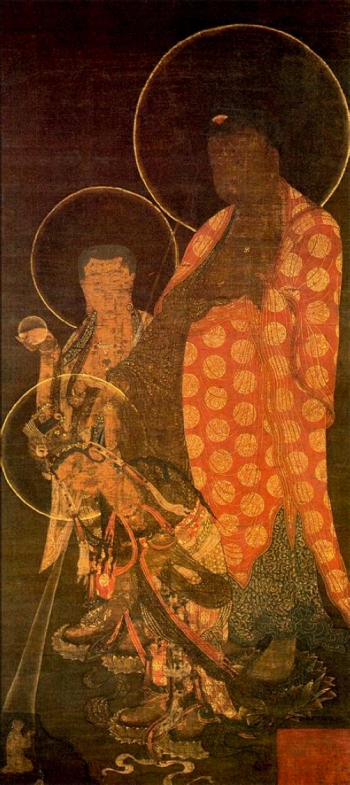 Amitabha triad. Korea, Goryeo period, 13th century, hanging scroll, ink and color on silk. From studyblue.com
Amitabha triad. Korea, Goryeo period, 13th century, hanging scroll, ink and color on silk. From studyblue.comFaith is not genuine if the practice is not always active
Master Shandao (613–81) introduced an important concept about faith in Amitabha’s deliverance and the correlation with the practice of Amitabha-recitation in Pure Land Buddhism. Name-recitation itself implies, contains, and nurtures faith. Faith in Amitabha’s deliverance alone, without any recitation practice, is insufficient for rebirth in the Land of Bliss. Faith is inherently reflected in our practice, and Amitabha-recitation must be taken as an active, exclusive, and sustained practice to assure rebirth.
How faith in Amitabha’s deliverance is related to Amitabha-recitation practice is discussed in the Commentary on the Treatise of Rebirth, by Master Tanluan (476–542), an eminent patriarch and pioneer in Pure Land Buddhism. When Master Tanluan explained the meaning of “my single-mindedness in taking Refuge in Amitabha Buddha,” he pointed out the improper ways of Amitabha-recitation practice which will lead to three kinds of crisis of faith, known as the Three Negations of Faith.
The first one is that faith is neither genuine nor pure if the practice is sometimes active and sometimes inert. With the wish to be reborn in the Land of Bliss, some people may waver between Buddha-power (through the practice of Amitabha-recitation) and self-power (through meditative and non-meditative practices). Therefore their practice of Amitabha-recitation is not consistently active, and so their faith is sometimes strong, sometimes weak, and sometimes even lost.
They do not know that all Buddhas are compassionate. Amitabha Buddha dedicates his pure and real merits and virtues to Amitabha-reciters and delivers them unconditionally and equally. He does not take our past karmic (impure and unreal) merit and virtue generated by our practices into account, as far as rebirth in the Pure Land is concerned. This is similar to Master Shandao’s explanation of Sincere Mind in the Commentary on the Contemplation Sutra.*
Faith is not decisive if the practice is not exclusive
The second crisis is when your faith is not yet decisive. In the same way, if your practice is not single-minded or exclusive, your faith is neither decisive nor deep. Though some people know all Buddhas are so compassionate that they will deliver all sentient beings in the ten directions, they wonder why they have to rely solely on Amitabha Buddha, and not other Buddhas, for the sake of rebirth in the Pure Land. They may invoke or recite other Buddhas’ names, instead of that of Amitabha alone.
Some Pure Land practitioners may not know the uniqueness of Amitabha’s Fundamental Vow. He personally welcomes and receives the iniquitous sentient beings of the ten directions near the end of their lives to his own splendid Reward Land, called the Land of Bliss. Therefore, amongst all the Buddhas, we have to select one Buddha that we can rely on for rebirth in the Pure Land.
As the Land of Bliss is the homeland of Amitabha Buddha, recitation of Amitabha’s name is the most direct cause of rebirth, in accordance with Amitabha’s Fundamental Vow. If we practice Amitabha-invocation exclusively, it shows that our faith in Amitabha’s deliverance is decisive. This is known as Deep Mind, as explained in Master Shandao’s Commentary on the Contemplation Sutra.
Faith is not sustained if the practice is intermittent
The third crisis is that faith is not sustained if our practice is intermittent. Once our faith in Amitabha’s deliverance is genuine and decisive, our practice must be active and exclusive at all times. It has to be sustained for the rest of one’s life. Master Shandao elaborates on how to cultivate Amitabha-recitation in his In Praise of the Rite of Rebirth, in which he explains that there are Four Cultivations: 1. Cultivation of Respective Practices; 2. Cultivation of Unmixed Practices; 3. Cultivation of Uninterrupted Practices; 4. Cultivation of Sustained Practices.
“Interrupted” means “separated by.” Uninterrupted practice means to undertake the Five Primary Practices continuously, uninterrupted by any other practices. It also means to avoid disruptions by afflictions such as greed, anger, and delusion. Yet ordinary beings cannot be entirely free from these things. If they arise, we should be aware of them and repent as soon as transgressions occur.
“Sustained” does not necessarily mean from minute to minute, second to second, or even breath to breath. It starts with our initial resolution and continues to the day we die, without cessation. Some people make their resolutions early, others late. Even if we do so today and pass away before the day is over, that is still considered sustained exclusive Amitabha-recitation practice, as long as we do not lose our resolve and faith in that time. It is similar to Master Shandao’s explication of Dedication-Aspiration Mind in the Commentary on the Contemplation Sutra.
Conclusion
If we do not mix it with any other practices, but always keep our Amitabha-recitation active, our faith is genuine. If we do not invoke other Buddhas and their pure lands, but exclusively invoke Amitabha Buddha, our faith is decisive. If we exclusively recite Amitabha’s name without interruption, our faith is sustained. When our faith is genuine, decisive, and sustained, this is what is called “my wholeheartedness in taking Refuge in Amitabha Buddha.”
Master Shandao states that reciting Amitabha’s name single-mindedly and without variation, whether walking, standing, sitting, or lying down, whether for long or short periods, is the karma of assurance. It is so because it accords with Amitabha Buddha’s vow. This is also known as Right Mindfulness in Pure Land Buddhism, verified by all the Buddhas of the ten directions, as it is said in the Amitabha Sutra.
* Master Shandao explained the Three States of Mind—Sincere Mind, Deep Mind, and Dedication-Aspiration Mind—in his Commentary on the Contemplation Sutra.















